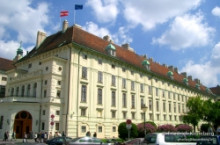Astronomy Schools and Programs in Australia
Find Schools by City:
CanberraTownsvilleAstronomy Studies in Australia
 Residence of the Federal President, Vienna, AustriaHave you always dreamed of studying Astronomy abroad as part of a student exchange or other international program? Have you considered Austria as a possible study destination? Austria is one of the most educated countries in the world, particularly in the scientific disciplines, and its university communities, loacted in its many fine cities, are well-known for welcoming and embracing international students. It is also a land of great scenic beauty, home to the Austrian Alps, as well as acres upon acres of pristine forestland, and a fantastic place to visit due to the depth and variety of its many sights and attractions.
Residence of the Federal President, Vienna, AustriaHave you always dreamed of studying Astronomy abroad as part of a student exchange or other international program? Have you considered Austria as a possible study destination? Austria is one of the most educated countries in the world, particularly in the scientific disciplines, and its university communities, loacted in its many fine cities, are well-known for welcoming and embracing international students. It is also a land of great scenic beauty, home to the Austrian Alps, as well as acres upon acres of pristine forestland, and a fantastic place to visit due to the depth and variety of its many sights and attractions.Located in Central Europe, Austria is a completely landlocked country, surrounded by Germany, the Czech Republic, Slovakia, Hungary, Italy, Switzerland, Slovenia and the Principality of Liechtenstein. The country is fairly small, about 33,000 square miles of total land area, of which 40 percent is rich forest land. As of the last census, the population of Austria was just a shade over 8 million, 20 percent of whom live in the country’s capital and largest city, Vienna. Most Austrians speak one of the Bavarian dialects of German, the country’s official language, and over three-quarters of the population identifies as Roman Catholic.
Astronomy Education in Austria
Astronomy education and research is carried out at several of Austria’s excellent universities, including the University of Innsbruck (UI), located in the city of the same name. Founded in 1669, UI is the largest and most prominent research and education institution in western Austria, with more than 27,000 students and over 4,000 faculty and staff. The university is comprised of 16 faculties, including the natural sciences, which offers astronomy and other related courses, including astrophysics, to interested students.Students enrolled in the Astronomy program at UI study the planets, stars and other objects outside the earth’s atmosphere, including their physical and chemical properties. Within the Astronomy discipline there are many different fields—fields in which students can concentrate their studies, and ultimately find employment and perform research. These positions include Cosmologists, a study of the universe as a whole; Astrometrists, scientists that study distances related to space and objects; Planetologists, individuals who study both planets within our solar system as well as the distant orbiting stars; and Mathematical Astromomers, people who, using numbers, calculations and statistics, study and attempt to explain the universe.
The Bachelor of Science programs in Astronomy and the disciplines related to its study typically span 3-4 years for full-time students, while graduate studies (Master of Science and Doctoral programs) can last an additional 2-6 years depending on the discipline.
Why Study Abroad in Austria
When most people think of Austria, they no doubt conjure up images of the snow-capped mountains of the Australian Alps and the deep green plains that were so brilliantly displayed in the movie “The Sound of Music.” And while Austria is certainly a land of breathtaking scenery and a one-of-a-kind haven for outdoor enthusiasts, it is also a culturally rich nation; a nation of beautiful cities, towns and villages featuring hundreds of things to do and see. Below are just a few examples of some of the sites and attractions that are sure to keep your days full and enjoyable when you’re not busy studying in the classroom or lab:Tiergarten
Founded by Franz Stephan as a menagerie in 1752, the Schönbrunn Tiergarten is the oldest zoo in the world and definitely one of the finest. The zoo is home to over 750 animals of many different species, including emus, Siberian Tigers, and several giant pandas that arrived from China in 2003.
Schloss Schönbrunn Gardens
Opened to the public by Joseph II in 1779, these beautifully manicured palace gardens, arranged in the French style, emit a symphony of bright colors during the spring and summer months. Among the many sights to see in the gardens is a replica of Roman ruins, and the Neptunbrunnen, or Neptune Fountain, a beautiful piece from Greek mythology.
Museums Quartier
Located in the heart of Vienna, the Museums Quartier, or Museums Quarter, is an outstanding collection of museums, restaurants, bars, and cafes, situated inside the former imperial stables designed by Fischer von Erlach. The most popular place in the city for both locals and tourists, the Quarter is the perfect place to relax and mingle with the people on a warm spring evening.
Sigmund Freud Museum
Last but not least is the Sigmund Freud Museum. Here visitors can catch a glimpse of the actual apartment where the father of psychoanalysis lived and worked until his forced departure from Vienna with the arrival of the German Nazis in 1938.
